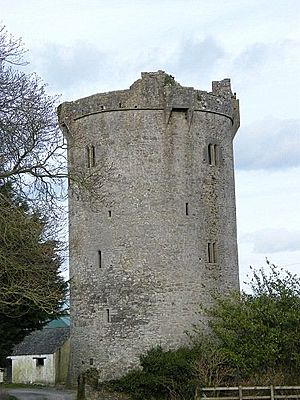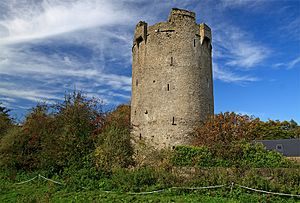Ballynahow Castle facts for kids
Quick facts for kids Ballynahow Castle |
|
|---|---|
| Native name Irish: Caisleán Bhaile na hAbha |
|
 |
|
| Type | tower house |
| Location | Ballynahow, Ballycahill, County Tipperary, Ireland |
| Elevation | 87 m (285 ft) |
| Height | 15.2 m (50 ft) |
| Built | c. 1500–1550 |
| Architectural style(s) | Tower house |
| Owner | Irish state |
| Official name: Ballynahow Castle | |
| Reference no. | 234 |
| Lua error in Module:Location_map at line 420: attempt to index field 'wikibase' (a nil value). | |
Ballynahow Castle is an old stone building called a tower house. It is also a National Monument in County Tipperary, Ireland. This means it is a special historical site protected by the government.
Contents
Where is Ballynahow Castle?
Ballynahow Castle is found about 4.6 km (2.9 mi) west-northwest of a town called Thurles. It stands on the west bank of the Farneybridge River. This river is a smaller stream that flows into the larger River Suir.
The History of Ballynahow Castle
Who Built Ballynahow Castle?
Ballynahow Castle was built a long time ago, in the early 1500s. It was built by the Purcell family. They were an important family in Ireland during that time.
What Happened to the Castle Over Time?
In the 1840s, the lower parts of the castle were used as a small house or cottage. Later, in 1930, the tower house became owned by the Irish government. This helped to protect it as a historical site.
Exploring the Tower House
How Tall is Ballynahow Castle?
This tower house, also known as a caiseal in Irish, stands about 15.2 m (50 ft) tall. That's about as high as a five-story building! At the very top, there's a walkway called a chemin de ronde.
Special Features of the Castle
The castle has four machicolations sticking out from the top. These were openings that allowed defenders to drop things on attackers below. The tower has five floors. It has narrow windows, called slit windows, and big fireplaces on the second and fourth floors.
The Secret Chamber
On the fourth floor, there is a hidden hole in the north wall. This hole leads to a secret chamber built right into the thick walls of the castle! Originally, the very top floor of the castle had a cone-shaped wooden roof. This roof was supported by special arches called squinches.
 | William Lucy |
 | Charles Hayes |
 | Cleveland Robinson |


